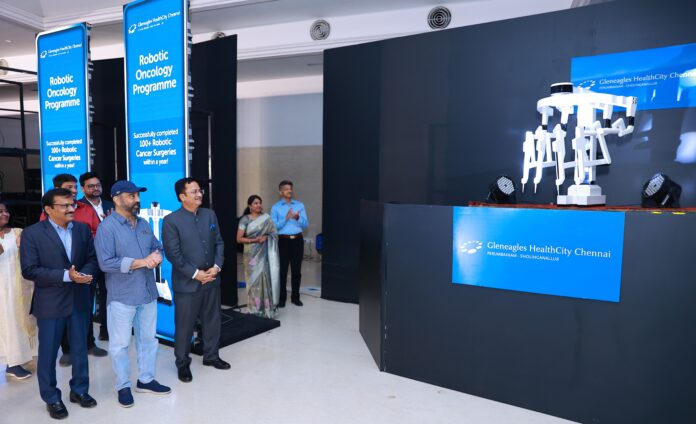Gleneagles HealthCity Chennai marks the completion of 100 plus robotic cancer surgeries within a year. The oldest patient was a 82 year old lady with stage III ovarian cancer who underwent robotic cytoreductive surgery with HIPEC a first in INDIA. This procedure was made possible with the latest Da Vinci Xi System, latest fourth-generation robot. The Hospital celebrated this accomplishment with Padma Shri Kamal Hasan, Actor and Director.
“This fourth-generation technology has enabled our hospital to conduct over 100 complex yet successful robotic cancer surgeries with unparalleled precision and efficiency thus signifying a critical leap forward in enhancing surgical capabilities and patient outcomes. This minimally invasive approach not only reduces recovery time drastically, with patients often discharged within days rather than weeks but also decreases blood loss and lowers the risk of complications. Also, we can confidently claim that all the surgeries performed by us are truly zero conversion surgeries. This means, there are no complications that have arisen post-surgery for the past year in any of our patients,” said Prof Dr S. Rajasundaram, Director, Gleneagles Cancer Institute, Head – Surgical Oncology and Director – Robotic Programme, Gleneagles HealthCity Chennai.
“The versatility of robotic surgery extends across various types of cancer, including esophageal, stomach, colon, rectal, and gynecological cancers allow for targeted cancer treatment without the need for extensive abdominal incisions, thereby improving patient outcomes and quality of life.
As per the press release, the precision afforded by robotic systems, equipped with 3D vision and high magnification capabilities, enhances surgical accuracy to unprecedented levels. Surgeons operating these consoles experience reduced physical strain, translating to sharper, more accurate procedures,” added Dr Rajasundaram.
“The future of medicine is undeniably headed towards technology-driven advancements. As more robotic programs are introduced, costs are expected to decrease, making robotic surgery increasingly accessible. This technology represents the future of surgical precision and accessibility; with advancements in 5G technology and artificial intelligence, expert surgeons will be able to operate remotely across vast distances, from Chennai to Trichy or anywhere globally,” said Dr Nageswar Rao, CEO, Gleneagles HealthCity Chennai.
























